 Tìm kiếm
Tìm kiếm
Phần thứ sáu Bộ luật Tố tụng hình sự 2015: Xét lại bản án và quyết định đã có hiệu lực pháp luật
| Số hiệu: | 101/2015/QH13 | Loại văn bản: | Luật |
| Nơi ban hành: | Thủ tướng Chính phủ | Người ký: | Nguyễn Sinh Hùng |
| Ngày ban hành: | 27/11/2015 | Ngày hiệu lực: | 01/01/2018 |
| Ngày công báo: | 31/12/2015 | Số công báo: | Từ số 1271 đến số 1272 |
| Lĩnh vực: | Trách nhiệm hình sự, Thủ tục Tố tụng | Tình trạng: | Còn hiệu lực |
TÓM TẮT VĂN BẢN
Bộ luật tố tụng hình sự 2015 vừa được ban hành ngày 27/11/2015 với nhiều quy định mới về cơ quan tiến hành tố tụng và người tiến hành tố tụng hình sự; người tham gia tố tụng HS; bào chữa, bảo về quyền và nghĩa vụ của bị hại, đương sự; biện pháp ngăn chặn, biện pháp cưỡng chế;...
Bộ luật tố tụng hình sự năm 2015 gồm 9 Phần, 36 Chương, 510 Điều (thay vì Bộ luật Tố tụng Hình sự 2003 gồm 8 Phần, 37 Chương, 346 Điều). Bộ luật TTHS 2015 gồm các Phần sau:
- Những quy định chung
- Khởi tố, điều tra vụ án hình sự
- Truy tố
- Xét xử vụ án hình sự
- Một số quy định về thi hành bản án, quyết định của Tòa án
- Xét lại bản án, quyết định đã có hiệu lực pháp luật
- Thủ tục đặc biệt
- Hợp tác quốc tế
- Điều khoản thi hành
Bộ luật tố tụng HS 2015 có một số quy định nổi bật sau:
- Điều 73 về quyền và nghĩa vụ của người bào chữa
Người bào chữa có quyền quy định tại Khoản 1 Điều 73 Bộ luật 101/2015/QH13, trong đó có quyền:
+ Gặp, hỏi người bị buộc tội;
+ Có mặt trong hoạt động đối chất, nhận dạng, nhận biết giọng nói và hoạt động điều tra khác theo Bộ luật tố tụng hình sự 2015;
+ Xem biên bản về hoạt động tố tụng có sự tham gia của mình, quyết định tố tụng liên quan đến người mà mình bào chữa;
+ Đề nghị tiến hành hoạt động tố tụng theo Bộ luật tố tụng hình sự năm 2015; đề nghị triệu tập người làm chứng, người tham gia tố tụng khác, người có thẩm quyền tiến hành tố tụng;
+ Kiểm tra, đánh giá và trình bày ý kiến về chứng cứ, tài liệu, đồ vật liên quan và yêu cầu người có thẩm quyền tiến hành tố tụng kiểm tra, đánh giá;
- Điều 78 Bộ luật số 101 tố tụng hình sự 2015 quy định thủ tục đăng ký bào chữa
+ Trong mọi trường hợp tham gia tố tụng, người bào chữa phải đăng ký bào chữa.
+ Khi đăng ký bào chữa, người bào chữa phải xuất trình các giấy tờ:
Luật sư xuất trình Thẻ luật sư kèm theo bản sao có chứng thực và giấy yêu cầu luật sư;
Người đại diện của người bị buộc tội xuất trình CMND hoặc thẻ Căn cước công dân kèm theo bản sao có chứng thực và giấy tờ có xác nhận về mối quan hệ của họ với người bị buộc tội;
Bào chữa viên nhân dân xuất trình CMND hoặc thẻ Căn cước công dân kèm theo bản sao có chứng thực và văn bản cử bào chữa viên nhân dân;
Trợ giúp viên pháp lý, luật sư thực hiện trợ giúp pháp lý xuất trình văn bản cử người thực hiện trợ giúp pháp lý và Thẻ trợ giúp viên pháp lý hoặc Thẻ luật sư kèm theo bản sao có chứng thực.
- Điều 85 Luật 101/2015/QH13 bổ sung một số vấn đề phải chứng minh trong vụ án hình sự gồm:
+ Nguyên nhân và điều kiện phạm tội;
+ Những tình tiết khác liên quan đến việc loại trừ trách nhiệm hình sự, miễn trách nhiệm hình sự, miễn hình phạt.
- Quy định dữ liệu điện tử tại Điều 99 Bộ luật tố tụng hình sự năm 2015
+ Dữ liệu điện tử được thu thập từ phương tiện điện tử, mạng máy tính, mạng viễn thông, trên đường truyền và các nguồn điện tử khác.
+ Giá trị chứng cứ của dữ liệu điện tử được xác định căn cứ vào cách thức khởi tạo, lưu trữ hoặc truyền gửi dữ liệu điện tử; cách thức bảo đảm và duy trì tính toàn vẹn của dữ liệu điện tử; cách thức xác định người khởi tạo và các yếu tố phù hợp khác.
- Điều 143 Bộ luật tố tụng hình sự bổ sung căn cứ khởi tố vụ án hình sự:
+ Kiến nghị khởi tố của cơ quan nhà nước;
Kiến nghị khởi tố là việc cơ quan nhà nước có thẩm quyền kiến nghị bằng văn bản và gửi kèm theo chứng cứ, tài liệu liên quan cho Cơ quan điều tra, Viện kiểm sát có thẩm quyền xem xét, xử lý vụ việc có dấu hiệu tội phạm.
- Khám nghiệm tử thi theo Điều 202 Luật số 101/2015/QH13
Khi khám nghiệm tử thi phải tiến hành chụp ảnh, mô tả dấu vết để lại trên tử thi; chụp ảnh, thu thập, bảo quản mẫu vật phục vụ công tác trưng cầu giám định; ghi rõ kết quả khám nghiệm vào biên bản. Biên bản khám nghiệm tử thi được lập theo Điều 178 Bộ luật TTHS 2015.
- Điều 215 Bộ luật tố tụng HS 2015 quy định yêu cầu định giá tài sản
+ Khi cần xác định giá của tài sản để giải quyết vụ án hình sự, cơ quan có thẩm quyền tiến hành tố tụng ra văn bản yêu cầu định giá tài sản.
+ Trong thời hạn 24 giờ kể từ khi ra văn bản yêu cầu định giá tài sản, cơ quan yêu cầu định giá phải giao hoặc gửi văn bản yêu cầu định giá tài sản, hồ sơ, đối tượng yêu cầu định giá tài sản cho Hội đồng định giá tài sản được yêu cầu; gửi văn bản yêu cầu định giá tài sản cho Viện kiểm sát có thẩm quyền thực hành quyền công tố và kiểm sát điều tra.
- Trường hợp áp dụng biện pháp điều tra tố tụng đặc biệt tại Điều 224 Bộ luật 101/2015/QH13
Có thể áp dụng biện pháp điều tra tố tụng đặc biệt đối với các trường hợp:
+ Tội xâm phạm an ninh quốc gia, tội phạm về ma túy, tội phạm về tham nhũng, tội khủng bố, tội rửa tiền;
+ Tội phạm khác có tổ chức thuộc loại tội phạm đặc biệt nghiêm trọng.
- Điều 322 Bộ luật tố tụng hình sự 2015 quy định việc tranh luận tại phiên tòa
+ Bị cáo, người bào chữa, người tham gia tố tụng khác có quyền trình bày ý kiến, đưa ra chứng cứ, tài liệu và lập luận của mình để đối đáp với Kiểm sát viên về những chứng cứ xác định có tội, chứng cứ xác định vô tội; tính chất, mức độ nguy hiểm cho xã hội của hành vi phạm tội; hậu quả do hành vi phạm tội gây ra; nhân thân và vai trò của bị cáo trong vụ án; những tình tiết tăng nặng, giảm nhẹ trách nhiệm hình sự, mức hình phạt; trách nhiệm dân sự, xử lý vật chứng, biện pháp tư pháp; nguyên nhân, điều kiện phạm tội và những tình tiết khác có ý nghĩa đối với vụ án.
Bị cáo, người bào chữa, người tham gia tố tụng khác có quyền đưa ra đề nghị của mình.
+ Kiểm sát viên phải đưa ra chứng cứ, tài liệu và lập luận để đối đáp đến cùng từng ý kiến của bị cáo, người bào chữa, người tham gia tố tụng khác tại phiên tòa.
Người tham gia tranh luận có quyền đáp lại ý kiến của người khác.
Bộ luật tố tụng hình sự năm 2015 có hiệu lực từ ngày 01/07/2016.
Văn bản tiếng việt
Văn bản tiếng anh
REVIEW OF SENTENCES AND RULINGS IN EFFECT
CASSATION PROCEDURE
Article 370. Nature of cassation procedure
The cassation procedure reviews a Court’s effective sentences and rulings under protest upon the exposure of a serious breach of law in the settlement of the case.
Article 371. Grounds for protest through the cassation procedure
A court’s sentences and rulings in effect shall be protested according to the cassation procedure in the presence of one of the following grounds:
1. The court’s sentences and rulings do not correspond with objective facts of the case;
2. A serious breach of legal proceedings for investigation, prosecution and adjudication resulted in a serious error in the settlement of the case;
3. An error in the application of the law occurred.
Article 372. Detection of effective sentences and rulings to be reviewed through the cassation procedure
1. The sentenced person, authorities, organizations and every person shall be entitled to expose violations of the laws in a Court’s sentences and rulings that have come into force, and inform individuals authorized to lodge protests.
2. The provincial People’s Court shall examine the effective sentences and rulings passed by a district People’s Court in order to detect violations of laws and propose the President of the Higher People’s Court or the Supreme People’s Court to lodge protests.
The military court of the military zone shall examine the effective sentences and rulings passed by a local military court to detect violations of laws and propose the President of the Central military court to lodge protests.
3. Individuals authorized to lodge protests shall be informed promptly in writing upon the Court’s or Procuracy's detection of violations of laws in a Court's judgments and rulings through the cassation review or administration of the process of adjudication or through other sources of information.
Article 373. Right to lodge protests through the cassation procedure
1. The president of the Supreme People’s Court and the head of the Supreme People’s Procuracy shall have the right to lodge protests through the cassation procedure, when deemed necessary, against the effective sentences and rulings passed by a Higher People’s Court or other Courts, except for the rulings pronounced by the Judicial panel of the Supreme People’s Court.
2. The president of the Central military court and the head of the Central military procuracy shall have the right to lodge protests through the cassation procedure against the effective sentences and rulings passed by a military Court of a military zone or a local military Court.
3. The president of the Higher People’s Court and the head of the Higher People’s Procuracy shall have the right to lodge protests through the cassation procedure against the effective sentences and rulings passed by a provincial People’s Court or a district People’s Court in conformity to the territorial jurisdiction.
Article 374. Procedures for notice of a Court’s effective rulings and sentences to be reviewed through the cassation procedure
1. The sentenced person, authorities and entities, when exposing violations of laws in the Court’s effective sentences and rulings, shall submit a written notice or give a direct presentation and evidences, documents and items, if available, to the individuals authorized to lodge protests or to the nearest Court or Procuracy.
2. A written notice shall contain these primary details:
a) Date;
b) Name and address of the authority or entity issuing the notice;
c) The court’s effective sentences or rulings in violation of the laws;
d) The details of violations exposed;
dd) The petition for the competent individuals' protests.
3. Such notice must bear the signature or fingerprint of the informing person or the corporate seal and signature of the legal representative of the authority or organization issuing the notice.
Article 375. Procedures for acquisition of notices of a Court’s effective rulings and sentences to be reviewed through the cassation procedure
1. The court or procuracy, when acquiring the written notice, shall input details into the notice receipt journal.
2. When the sentenced person, authorities or entities directly state the violations of laws in a Court’s effective sentences and rulings, the Court or Procuracy must record details stated in writing. If the informing person provides evidences, documents and items, the Court and Procuracy must execute a written record of custody. Such written record shall be made according to Article 133 of this Law.
3. The court or procuracy that receives the written notice and execute written records must send such notice and records with evidences, documents and items, if available, to the individuals authorized to lodge protests. Moreover, the sentenced person, authorities and entities making requests shall be informed in writing.
Article 376. Transfer of case files for contemplation of protests through the cassation procedure
1. The court or procuracy, if in need of examining the case file to contemplate protests through the cassation procedure, shall be entitled to request in writing the Court managing such file to have it transferred.
The court managing the case file, in 07 days upon receiving the written request, must have it transferred to the Court or Procuracy making such request.
2. If the Court and Procuracy simultaneously issue their written requests, the Court managing the case file shall have it transferred on first-come basis and inform the later one.
Article 377. Suspension of the enforcement of sentences and rulings protested through the cassation procedure
The individual issuing the decision to protest sentences and rulings in effect through the cassation procedure shall be entitled to suspend the enforcement of such rulings and sentences.
The decision to suspend the enforcement of sentences and rulings protested through the cassation procedure must be sent to the Court and Procuracy, which held the trials at first and second instance, and competent sentence enforcement authorities.
Article 378. Decision to lodge protests through the cassation procedure
A decision to lodge protests through the cassation procedure shall contain these primary details:
1. The number and date of the decision;
2. The individual authorized to make the decision;
3. The number and date of the sentence or ruling protested;
4. Remarks and analysis of violations and errors in the sentence or ruling protested;
5. Legal grounds that lead to the decision to protest;
6. The decision to protest the whole or parts of the sentence or ruling;
7. The name of the Court empowered to perform the cassation review of the case;
8. The requests by the individual initiating protests.
Article 379. Time limit for protests through the cassation procedure
1. The time limit for protests against the sentenced person shall be 01 year upon the effect of the sentence or ruling.
2. Protests in favor of the sentenced person shall be initiated any time, even for the exoneration of the sentenced person who passed away.
3. Protests on litigants’ civil matters in a criminal case shall abide by the Civil procedure code.
4. If there is no ground to lodge protests through the cassation procedure, the individual authorized to protest must inform the requesting authorities and entities in writing of his decision not to protest and reasons.
Article 380. Delivery of decisions to protest through the cassation procedure
1. The decision to protest through the cassation procedure must be promptly delivered to the Court that passed the effective sentence and ruling protested, the sentenced person, competent authorities enforcing criminal or civil sentences, and other people having interests and duties related to the protests.
2. If the President of the Supreme People’s Court initiates protests, the decision to protest and case file must be promptly delivered to the Court empowered to conduct cassation procedure.
If the President of the Higher People’s Court or Central military court initiates protests, the decision to protest and case file must be promptly delivered to the competent Procuracy.
The court empowered to conduct cassation procedure must deliver the decision to protest and case file to the equivalent Procuracy. The procuracy, in 30 days upon receiving the case file, must send back the file to the Court.
3. If the head of the Supreme People’s Procuracy or Higher People’s Procuracy or Central military procuracy initiates protests, the decision to protest and case file must be promptly delivered to the Court empowered to conduct the cassation procedure.
Article 381. Amendment or revocation of protests
1. Before trial or at the court of cassation, the protesting individual shall be entitled to supplement and amend protests if the time limit for protests is still effective. Amendments to the protests before trial must be executed through written decisions and delivered according to Section 1, Article 380 of this Law. Amendments to the protests in court shall be inputted into the court record.
2. Before trial or in the court of cassation, the protesting individual shall be entitled to withdraw parts or the whole of the protests. The withdrawal of protests before trial must be executed through written decisions. The withdrawal of protests in court shall be inputted into the court record.
3. If all protests are withdrawn before trial, the President of the Court empowered to conduct the cassation procedure shall decide to dismiss the trial of cassation. If all protests are withdrawn in court, the Trial panel shall decide to dismiss the trial of cassation.
The court, in 02 days upon issuing its decision to dismiss the trial of cassation, shall send such decision to the persons as stated in Section 1, Article 380 of this Law and to the equivalent Procuracy.
Article 382. Jurisdiction over cassation procedure
1. Committee of Judges of the Higher People’s Court conducts the cassation procedure through a Judicial panel of three judges to review effective sentences and rulings passed by provincial People’s Courts or district People's Courts in conformity to the territorial jurisdiction.
2. Plenary assembly of the Committee of Judges of the Higher People’s Court conducts the cassation review of effective rulings and sentences passed by a People’s Court as per Section 1 of this Article, which comprise complex elements, or sentences and rulings reviewed by the 3-judge Judicial panel established the Committee of Judges of the Supreme People’s Court through the cassation procedure without reaching an agreement on the settlement of the case through voting.
When the Plenary assembly of the Committee of Judges of the Higher People’s Court holds the trial of cassation, two thirds of its members must be attend the trial, which is chaired by the President of the Supreme People’s Court. Rulings of the Plenary assembly of the Committee of Judges must be approved by more than half of its members; otherwise, the trial shall be adjourned. Plenary assembly of the Committee of Judges, in 30 days upon adjournment of the trial, must resume the trial.
3. Committee of Judges of the Central military court conducts the cassation review of effective sentences and rulings passed by a military court of a military zone or local military court. More than two thirds of members of the Committee of Judges of the Central military court must attend the trial of cassation, which is chaired by the President of the Central military court. Rulings of the Committee of Judges must be approved by more than half of its members; otherwise, the trial shall be adjourned. Committee of Judges, in 30 days upon adjournment of the trial, must resume the trial.
4. Justices’ Council of the Supreme People’s Court assigns a Judicial panel of five Judges to conduct the cassation review of effective rulings and sentences passed the Higher People’s Court or Central military court.
5. Plenary assembly of Judges of the Supreme People’s Court conducts the cassation review of effective rulings and sentences as stated in Section 4 of this Article, which comprise complex elements, or effective rulings and sentences reviewed by the Judicial panel of five Judges of the Justices’ Council of the Supreme People’s Court through the cassation procedure without reaching an agreement on the settlement of the case by voting.
More than two thirds of members of the Plenary assembly of Judges of the Supreme People’s Court must be present at the trial of cassation, which is chaired by the President of the Supreme People’s Court. Rulings of the Plenary assembly of Judges of the Supreme People’s Court must be approved by more than half of its members; otherwise, the trial shall be adjourned. Plenary assembly of Judges, in 30 days upon adjournment of the trial, must resume the trial.
6. Justices’ Council of the Supreme People’s Court shall conduct the cassation review of the entire lawsuit, whose effective sentences and rulings protested fall into different levels of jurisdiction over cassation procedure.
Article 383. Participants in a trial of cassation
1. The procurator assigned by the equivalent Procuracy must attend the trial of cassation.
2. The court, when perceiving the necessity or grounds to amend parts of an effective sentence or ruling, must summon the sentenced person, defense counsel and individuals having interests and duties related to the protests to the court of cassation. The trial of cassation shall occur despite the absence of the said people.
Article 384. Preparation for a trial of cassation
The court president shall assign a Judge from the Judicial panel of cassation to prepare an verbal report on the case. Such report shall summarize the details of the case, the Courts’ sentences and ruling, and particulars of the protests.
The verbal report and relevant documents must be sent to the members of the Judicial panel of cassation not later than 07 days before trial.
Article 385. Time limit for the start of a trial of cassation
The court given authority to conduct the cassation procedure, in 04 months upon receiving the decision to protest and case file, must start the trial.
Article 386. Procedures for a trial of cassation
1. After the presiding judge commences the trial, a member of the Judicial panel of cassation shall present the verbal report on the case. Other members of the Judicial panel of cassation, before discussing and expressing their opinions on the settlement of the case, shall address questions about unclear details to the Judge delivering the verbal report. If the protests are lodged by the Procuracy, the Procurator shall present the details of such protests.
2. If the sentenced person, defense counsel or individuals having duties and interests related to the protests appear in court, they shall be permitted to state opinions at the requests for the Judicial panel of cassation.
The procurator shall present the Procuracy’s opinions on the decision to protest and the settlement of the case/
The procurator and participants in the trial of cassation shall present their oral arguments on relevant issues in connection with the settlement of the case. The presiding judge must allow the Procurator and participants in legal proceedings to express all opinions in just and equal manners before the court.
3. Members of the Judicial panel of cassation shall present their opinions and converse. The judicial panel of cassation shall take vote and announce its rulings on the settlement of the case.
Article 387. Scope of cassation procedure
The judicial panel of cassation must review the entire case beyond the boundary of the protests.
Article 388. Powers of the Judical panel of cassation
1. Reject the protests and sustain the effective sentences and rulings that have been protested.
2. Abrogate the sentences and rulings in effect and sustain lawful judgments and decisions of the Court of first instance or second instance, which were annulled or modified unlawfully.
3. Abrogate sentences and rulings in effect for re-investigation or retrial.
4. Abrogate sentences and rulings in effect and dismiss the case.
5. Redress sentences and rulings in effect.
6. Terminate the cassation procedure.
Article 389. Rejection of protests and sustainment of effective sentences and rulings under protest
The judicial panel of cassation shall reject the protests and sustain the effective sentences and rulings under protest if such rulings and sentences are deemed justified and statutory.
Article 390. Abrogation of sentences and rulings in effect and sustainment of lawful judgments and decisions of a Court of first instance or second instance, which were annulled or modified unlawfully
The judicial panel of cassation shall decide to abrogate the sentences and rulings in effect and sustain the lawful judgments and decisions of the Court of first instance or second instance, which were annulled or modified unlawfully.
Article 391. Abrogation of sentences and rulings in effect for re-investigation or retrial
The judicial panel of cassation shall abrogate the effective sentences and rulings, partly or wholly, for re-investigation or retrial in the presence of one of the grounds as defined in Article 371 of this Law. In the event of retrial, the Judicial panel of cassation shall, as the case may be, decide to have the case retried in the first or second instance.
If the continued detention of the defendant is deemed necessary, the Judicial panel of cassation shall order such detention until a Procuracy or Court handles the case again.
Article 392. Abrogation of sentences and rulings in effect and dismissal of the case
The judicial panel of cassation shall abrogate the sentences and rulings in effect and dismiss the case in the presence of one of the grounds as defined in Article 157 of this Law.
Article 393. Rectification of sentences and rulings in effect
The judicial panel of cassation shall redress the sentences and rulings in effect upon the fulfillment of all conditions below:
1. Documents and evidences in the case file are sufficient and explicit;
2. The rectification of the sentences and rulings does not alter the nature of the case or worsen the sentenced person's circumstances or put the crime victims and litigants at disadvantage.
Article 394. Decision to institute the cassation procedure
1. A judicial panel of cassation shall issue a decision to institute the cassation procedure in the name of the Socialist Republic of Vietnam.
2. The decision to institute the cassation procedure shall comprise:
a) The date and location of the trial;
b) The full name of members of the Judicial panel of cassation;
c) The full name of the Procurator exercising the prosecution rights and administering the trial;
d) The name of the case reviewed by the Judicial panel through the cassation procedure;
dd) The name, age and address of the sentenced person and individuals having interests and duties in connection with the decision to institute the cassation procedure;
e) Summarize the case and parts of the effective sentences and rulings under protest;
g) The decision to protest and justifications;
h) Remarks by the Judicial panel of cassation, including the analysis of the said justifications for the approval or rejection of the protests;
i) Points, sections and articles of the Criminal Procedure Law and Criminal Code, which are adduced by the Judicial panel of cassation in its decisions;
k) The decisions by the Judical panel of cassation.
Article 395. Effect of rulings from the cassation procedure and delivery of such rulings
1. The rulings by the Judical panel of cassation shall come into force as of the date of pronouncement.
2. The judicial panel of cassation, in 10 days upon pronouncing its rulings, must have them delivered to the sentenced person, individuals filing protests, equivalent Procuracy, Procuracy and Court that held the first-instance or appellate trial. Moreover, competent authorities enforcing criminal or civil sentences, individuals having interests and duties related to the protests or their representatives shall receive such rulings. Furthermore, a written notice shall be sent to the local authorities at the commune, ward and town where the sentenced person resides or his workplace of educational facility.
Article 396. Time limit for transfer of case file for re-investigation or retrial
If the Judicial panel of cassation decides to abrogate a sentence or ruling in effect for re-investigation, the case file, in 15 days upon the issuance of such decision, must be transferred to the equivalent Procuracy for re-investigation according to this Law.
If the Judicial panel of cassation decides to abrogate a sentence or ruling in effect for retrial in the first or second instance, the case file, in 15 days upon the issuance of such decision, must be transferred to a competent Court for retrial according to this Law.
REOPENING PROCEDURE
Article 397. Nature of reopening procedure
The reopening procedure reviews a Court’s effective sentences and rulings under protest upon the exposure of new facts that may alter the fundamentals of such sentences and rulings, given that the said Court had no knowledge of such facts when passing its judgments and decisions.
Article 398. Grounds for protest through reopening procedure
A court’s sentences and rulings in effect shall be protested through the reopening procedure in the presence of one of the following grounds:
1. There are grounds to ascertain the falseness of vital details in witness testifiers' statements, findings of expert examinations and property valuation, interpreters’ metaphrase, written translations;
2. Investigators, Procurators, Judges and lay assessors had no knowledge of certain facts and, consequently, drew inaccurate conclusions that made the Court’s effective sentences and rulings deviate from the objective truths of the case;
3. Evidences, records of investigation, prosecution or adjudication, records of other legal proceedings or other proofs, papers and items in the case were falsified or inaccurate.
4. Other facts that made the Court’s effective rulings and sentences deviate from the objective truths of the case.
Article 399. Announcement and verification of facts newly found
1. The sentenced person, authorities, organizations and every person shall be entitled to find new facts of the case and send written notice and relevant documents to the Procuracy or Court. When the Court receives such notice or finds new facts itself, it must promptly send a written notice and relevant documents to the head of the Procuracy authorized to lodge protests through reopening procedure. The head of the Procuracy authorized to lodge protests through reopening procedure shall issue decisions to verify such facts.
2. The procuracy must verify new facts, when deemed necessary. The head of the Procuracy authorized to lodge protests through reopening procedure shall request the competent investigation authorities to verify new facts and convey findings to the Procuracy.
3. When verifying new facts, the Procuracy and investigation authorities shall be entitled to implement investigative and procedural methods according to this Law.
Article 400. Individuals authorized to lodge protests through the reopening procedure
1. The head of the Supreme People’s Procuracy shall have the right to lodge protests through the reopening procedure against the effective sentences and rulings passed by a Court, save the decisions by the Justices’ Council of the Supreme People’s Court.
2. The head of the Central military procuracy shall have the right to lodge protests through the reopening procedure against the effective sentences and rulings passed by a military Court of a military zone or a local military Court.
3. The head of the Higher People’s Procuracy shall have the right to lodge protests through the reopening procedure against the effective sentences and rulings passed by a provincial People’s Court or a district People’s Court in conformity to the territorial jurisdiction.
Article 401. Time limit for protests through the reopening procedure
1. The reopening procedure against the sentenced person shall only be permissible within the prescriptive period for criminal prosecution, as defined in Article 27 of the Criminal Code. The time limit for filing of protests shall not exceed 01 year upon the Procuracy's receipt of information on newly found facts.
2. The reopening procedure in favor of the sentenced person shall not be restricted in time and shall be permissible for the exoneration of the sentenced person who is deceased.
3. Protests regarding litigants’ civil matters in a criminal case shall abide by the Civil procedure code.
Article 402. Powers of the Judical panel of reopening
1. Reject the protests and sustain the effective sentences and rulings that have been protested.
2. Abrogate a Court's sentences and rulings in effect for re-investigation or retrial.
3. Abrogate sentences and rulings in effect and dismiss the case.
4. Dismiss the reopening trial.
Article 403. Other proceedings of the reopening procedure
Other proceedings of the reopening procedure shall follow the stipulations on the proceedings of the cassation procedure as per this Law.
PROCEDURES FOR THE REVIEW OF RULINGS BY THE JUSTICES’ COUNCIL OF THE SUPREME PEOPLE’S COURT
Article 404. Requests, requisitions and propositions for the review of rulings by the Justices’ Council of the Supreme People’s Court
1. In the presence of grounds that indicate the serious breach of laws in the rulings by the Justices’ Council of the Supreme People’s Court, the Justices’ Council of the Supreme People’s Court must meet and review such rulings at the requests by the Standing Committee of the National Assembly or as per the requisitions by the Judiciary Committee of the National Assembly or the head of the Supreme People’s Procuracy or according to the propositions by President of the Supreme People’s Court. The same applies upon the revelation of new significant facts that were beyond the knowledge of the Justices’ Council of the Supreme People's Court upon the passing of its rulings and may alter the fundamentals of such rulings.
2. The president of the Supreme People’s Court, at the requests the Standing Committee of the National Assembly, shall be held responsible for reporting to the Justices’ Council of the Supreme People’s Court for the review of the rulings of the Justices’ Council of the Supreme People's Court.
3. In response to the requisitions by the Judiciary Committee of the National Assembly and the head of the Supreme People's Procuracy, the Justices’ Council of the Supreme People's Court shall conduct the meeting to review its rulings.
In response to the propositions by the President of the Supreme People's Court, the Justices’ Council of the Supreme People's Court shall enter a meeting to review its rulings.
Article 405. Participants in the meeting organized by the Justices’ Council of the Supreme People’s Court for examination of requisitions and propositions
1. The head of the Supreme People’s Procuracy must attend the meeting of the Justices’ Council of the Supreme People’s Court to examine the requisitions by the Judicial Committee of the National Assembly or by the head of the Supreme People’s Procuracy or the propositions by the President of the Supreme People's Court.
2. The representative of the Judicial Committee of the National Assembly shall be invited to the meeting of the Justices’ Council of the Supreme People’s Court to examine the requisitions by the Judicial Committee of the National Assembly.
3. Relevant authorities and entities can be invited by the Supreme People's Court to the meeting, if deemed necessary.
Article 406. Preparation of the meeting for examination of requisitions and propositions
1. Upon the receipt of requisitions from the Judicial Committee of the National Assembly or the head of the Supreme People’s Procuracy or written propositions from the President of the Supreme People’s Court for the review of the rulings of the Justices' Council of the Supreme People's Court, the Supreme People's Court shall send copies of such requisitions or propositions and case files to the Supreme People’s Procuracy for the latter’s preparation of its presentation in the meeting for examination of such requisitions or propositions.
The president of the Supreme People’s Court shall have documents examined and report to the Justices’ Council of the Supreme People’s Court for the latter to consider details and make decisions in the meeting.
2. In 30 days upon the receipt of requisitions from the Judicial Committee of the National Assembly or the head of the Supreme People’s Procuracy or upon the proposition in writing by the President of the Supreme People’s Court, the Justices’ Council of the Supreme People’s Court must carry out the meeting to examine such requisitions or propositions. Moreover, the head of the Supreme People’s Procuracy shall be informed in writing of the time and location of such meeting.
Article 407. Procedures for the organization of a meeting for examination of requisitions and propositions
1. The president of the Supreme People’s Court shall himself or assign a member of the Justices’ Council of the Supreme People’s Court to present the case and its settlement in brief.
2. The representative of the Judicial Committee of the National Assembly, the President of the Supreme People’s Court, the head of the Supreme People's Procuracy, requisitioning for or proposing the review of the rulings of the Justices' Council of the Supreme People's Court, shall present the following particulars:
a) The content of the requisitions or propositions;
b) The grounds for such requisitions or propositions;
c) The analysis of evidences existing and arising (if any) to evince the serious breach of laws in the rulings of the Justices’ Council of the Supreme People's Court, or new facts that may alter the fundamentals of such rulings.
3. For the examination of requisitions from the Judicial Committee of the national Assembly or propositions from the President of the Supreme People’s Court, the head of the Supreme People’s Procuracy shall state opinions on the grounds and validity of such requisitions or propositions and specify standpoints and reasons for his consent to or dissent against such propositions or requisitions.
4. Justices’ Council of the Supreme People's Court discuss details and take vote under majority rule on its accord or discord with the requisitions or propositions for the review of the rulings of the Justices’ Council of the Supreme People’s Court.
5. Justices’ Council of the Supreme People’s Court, if concurring with requisitions from the Judicial Committee of the National Assembly or the head of the Supreme People’s Procuracy or propositions from the President of the Supreme People’s Court, shall decide to engage in a meeting to review its rulings.
6. Every event of the meeting for examination of requisitions or propositions and the decisions passed in such meeting shall be inputted into the meeting record and the archive of documents for examination of such requisitions or propositions.
Article 408. Notice of results of the meeting for examination of requisitions or propositions
At the end of the meeting, the Justices’ Council of the Supreme People’s Court shall inform the Judicial Committee of the National Assembly and the head of the Supreme People's Procuracy in writing of the results of the meeting and the accord or discord with the requisitions or propositions. The written notice must specify reasons for the consent to or dissent against requisitions or propositions.
If the result of the examination meeting of the Justices’ Council of the Supreme People’s Court is deemed not satisfactory, the Judicial Committee of the National Assembly, the head of the Supreme People’s Procuracy and the President of the Supreme People’s Court shall be entitled to report to the Standing Committee of the National Assembly for the latter’s decisions.
Article 409. Assessment of case files; verification and collection of evidences, documents and items
1. At the requests by the Standing Committee of the National Assembly or as per the consent of the Justices' Council of the Supreme People's Court to the review of its rulings, the President of the Supreme People's Court shall organize the assessment of case files and the verification and collection of evidences, documents and items, if necessary.
2. The assessment of case files, verification and collection of evidences, documents and items must clarify the existence of serious violations of laws or new significant facts that may alter the fundamentals of the rulings of the Justices' Council of the Supreme People's Court.
Article 410. Time limit for the start of the meeting to review rulings of Justices’ Council of the Supreme People’s Court
1. In 04 months upon the receipt of requests from the Standing Committee of the National Assembly or upon the consent of the Justices’ Council of the Supreme People’s Court to the review of its rulings, the Justices’ Council of the Supreme People’s Court must open the meeting.
2. At the requests for the Standing Committee of the National Assembly, the Supreme People’s Court shall inform the Supreme People’s Procuracy in writing of the time and location of the meeting to review the former’s rulings and provide case files.
Article 411. Procedures and authority to review the rulings of the Justices’ Council of the Supreme People's Court
1. The head of the Supreme People’s Procuracy must attend the meeting to review the rulings of the Justices’ Council of the Supreme People’s Court and express opinions on the existence of serious violations of laws or new significant facts that may alter the fundamentals of the rulings of Justices' Council of the Supreme People's Court. Moreover, he shall state standpoints on the settlement of the case.
2. After the report by the President of the Supreme People's Court and presentations by the head of the Supreme People’s Procuracy and concerned authorities and entities (if any), the Justices’ Council of the Supreme People's Court shall decide to:
a) Refuse the requests by the Standing Committee of the National Assembly, requisitions by the Judicial Committee of the National Assembly or the head of the Supreme People’s Procuracy, and propositions by the President of the Supreme People’s Court, and sustain the rulings of the Justices’ Council of the Supreme People’s Court;
b) Rescind the rulings of the Justices’ Council of the Supreme People’s Court, effective sentences and rulings in violation of the laws and decisions on the particulars of the case;
c) Rescind the rulings of the Justices’ Council of the Supreme People’s Court, effective sentences and rulings and determine liabilities for amends according to the laws;
d) Rescind the rulings of the Justices’ Council of the Supreme People’s Court, effective sentences and rulings in violation of the laws for re-investigation or retrial.
3. Rulings of the Justices’ Council of the People’s Supreme Court must be approved by more than three fourth of its members.
Article 412. Delivery of decisions by the Justices’ Council of the Supreme People’s Court on the review of its rulings
After the Justices’ Council of the Supreme People’s Court issues one of the decisions as defined in Article 411 of this Law, the Supreme People’s Court shall deliver such decision to the Standing Committee and the Judicial Committee of the National Assembly, the Supreme People's Procuracy, investigation authorities, procuracies and courts that settled the case and concerned individuals.
Văn bản liên quan
Cập nhật
Điều 155. Khởi tố vụ án hình sự theo yêu cầu của bị hại
Điều 157. Căn cứ không khởi tố vụ án hình sự
Điều 268. Thẩm quyền xét xử của Tòa án
Điều 285. Viện kiểm sát rút quyết định truy tố
Điều 367. Thủ tục xem xét bản án tử hình trước khi thi hành
Điều 401. Thời hạn kháng nghị theo thủ tục tái thẩm
Ðiều 419. Áp dụng biện pháp ngăn chặn, biện pháp cưỡng chế
Điều 447. Điều kiện và thẩm quyền áp dụng biện pháp bắt buộc chữa bệnh
Điều 57. Người bị tố giác, người bị kiến nghị khởi tố
Điều 58. Người bị giữ trong trường hợp khẩn cấp, người bị bắt
Điều 65. Người có quyền lợi, nghĩa vụ liên quan đến vụ án
Điều 73. Quyền và nghĩa vụ của người bào chữa
Điều 75. Lựa chọn người bào chữa
Điều 76. Chỉ định người bào chữa
Điều 78. Thủ tục đăng ký bào chữa
Điều 80. Gặp người bị bắt, người bị tạm giữ, bị can, bị cáo đang bị tạm giam
Điều 83. Người bảo vệ quyền và lợi ích hợp pháp của người bị tố giác, người bị kiến nghị khởi tố
Điều 84. Người bảo vệ quyền và lợi ích hợp pháp của bị hại, đương sự
Điều 148. Tạm đình chỉ việc giải quyết tố giác, tin báo về tội phạm, kiến nghị khởi tố
Điều 241. Áp dụng, thay đổi, hủy bỏ biện pháp ngăn chặn, biện pháp cưỡng chế
Điều 278. Áp dụng, thay đổi, hủy bỏ biện pháp ngăn chặn, biện pháp cưỡng chế
Điều 347. Áp dụng, thay đổi, hủy bỏ biện pháp ngăn chặn, biện pháp cưỡng chế
Điều 133. Chương trình an toàn, vệ sinh lao động
Mục 4. LAO ĐỘNG LÀ NGƯỜI KHUYẾT TẬT
Điều 41. Nhiệm vụ, quyền hạn và trách nhiệm của Viện trưởng, Phó Viện trưởng Viện kiểm sát
Điều 42. Nhiệm vụ, quyền hạn và trách nhiệm của Kiểm sát viên
Điều 110. Giữ người trong trường hợp khẩn cấp
Điều 125. Hủy bỏ hoặc thay thế biện pháp ngăn chặn
Điều 156. Thay đổi hoặc bổ sung quyết định khởi tố vụ án hình sự
Điều 169. Chuyển vụ án để điều tra
Điều 173. Thời hạn tạm giam để điều tra
Điều 180. Thay đổi hoặc bổ sung quyết định khởi tố bị can
Điều 228. Hủy bỏ việc áp dụng biện pháp điều tra tố tụng đặc biệt
Điều 236. Nhiệm vụ, quyền hạn của Viện kiểm sát khi thực hành quyền công tố trong giai đoạn truy tố
Điều 238. Giao, nhận hồ sơ vụ án và bản kết luận điều tra
Điều 246. Giải quyết yêu cầu điều tra bổ sung của Tòa án
Điều 368. Thủ tục xét tha tù trước thời hạn có điều kiện
Điều 433. Khởi tố bị can, thay đổi, bổ sung quyết định khởi tố bị can đối với pháp nhân
Điều 443. Tạm đình chỉ điều tra, đình chỉ điều tra, đình chỉ vụ án, đình chỉ bị can, bị cáo
Điều 457. Quyết định áp dụng thủ tục rút gọn
Bài viết liên quan
Lệnh cấm đi khỏi nơi cư trú giao cho ai năm 2025?
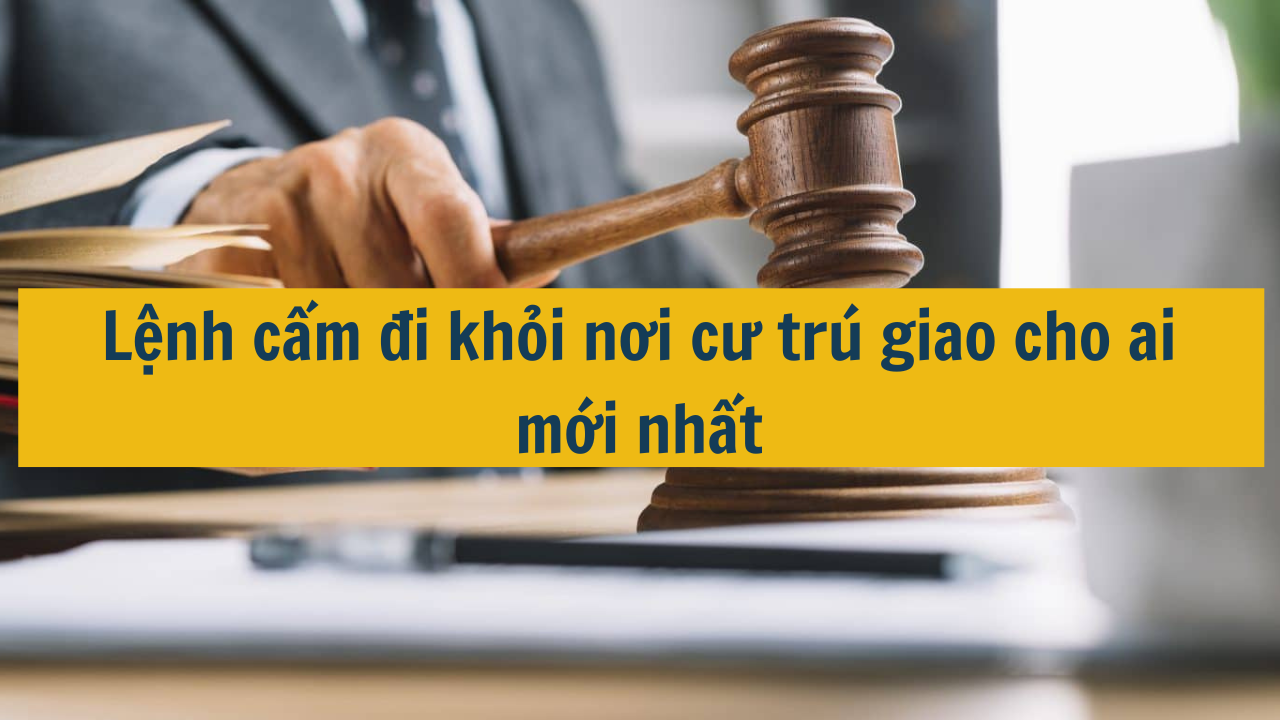
Lệnh cấm đi khỏi nơi cư trú giao cho ai năm 2025?
Lệnh cấm đi khỏi nơi cư trú thuộc thẩm quyền của ai. Bài viết sau đây sẽ làm rõ vấn đề này và các vẫn đề liên quan. 21/01/2025Thời hạn lệnh cấm đi khỏi nơi cư trú là bao lâu mới nhất năm 2025?
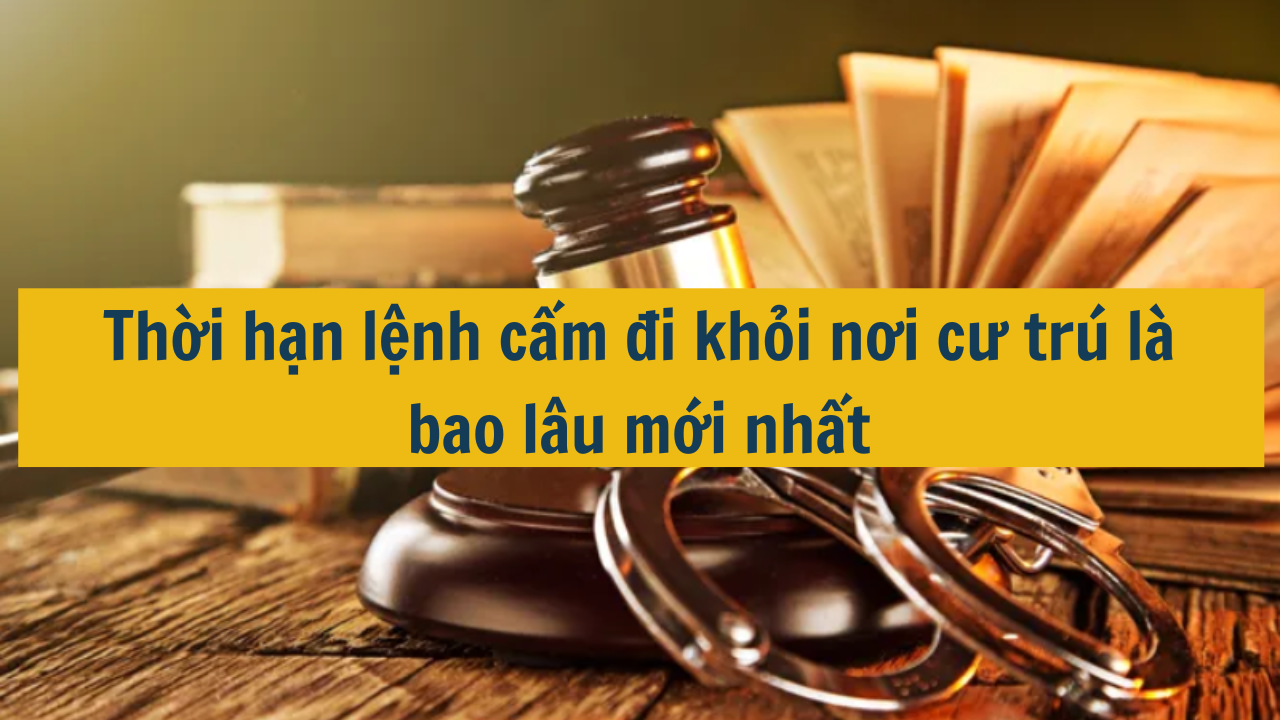
Thời hạn lệnh cấm đi khỏi nơi cư trú là bao lâu mới nhất năm 2025?
Người bị cấm đi khỏi nơi cư trú theo quy định của Bộ luật tố tụng hình sự 2015 sẽ bị hạn chế một số quyền, tuy nhiên vẫn có quy định về thời hạn của lệnh cấm đi khỏi nơi cư trú. Sau đây là bài viết về thời hạn lệnh cấm đi khỏi nơi cư trú là bao lâu mới nhất năm 2025 và các vấn đề liên quan. 21/01/2025Mẫu lệnh cấm đi khỏi nơi cư trú của Tòa án mới nhất năm 2025
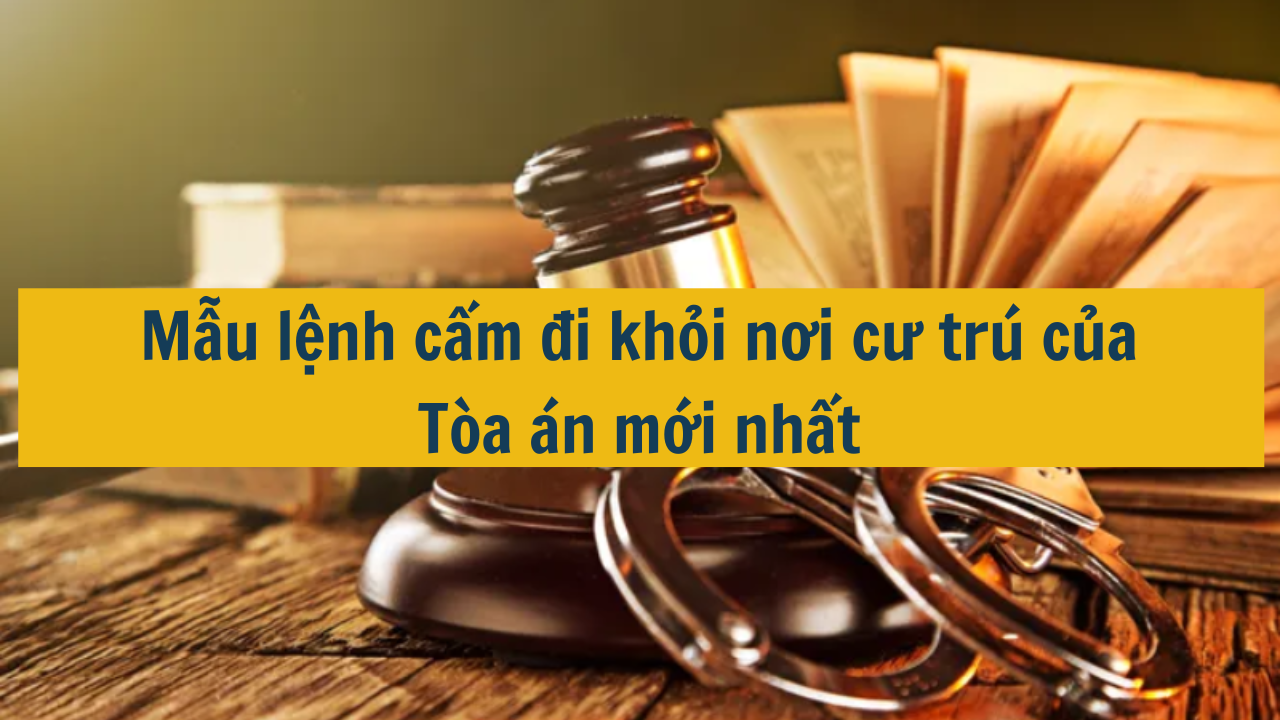
Mẫu lệnh cấm đi khỏi nơi cư trú của Tòa án mới nhất năm 2025
Người bị cấm đi khỏi nơi cư trú theo quy định của Bộ luật tố tụng hình sự 2015 sẽ bị hạn chế một số quyền. Sau đây là mẫu lệnh cấm đi khỏi nơi cư trú của Tòa án mới nhất 2025 và một số vấn đề liên quan. 21/01/2025Thế nào là cấm đi khỏi nơi cư trú? Ai có thẩm quyền ra lệnh cấm đi khỏi nơi cư trú mới nhất 2025?
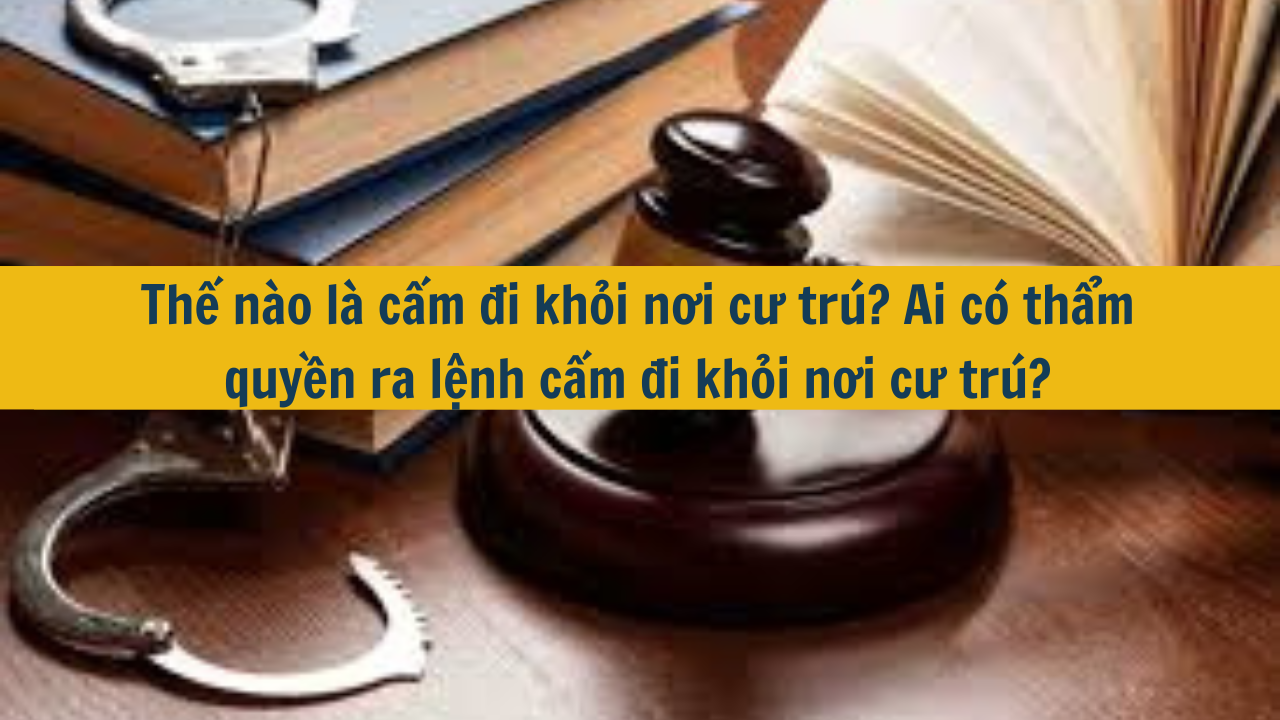
Thế nào là cấm đi khỏi nơi cư trú? Ai có thẩm quyền ra lệnh cấm đi khỏi nơi cư trú mới nhất 2025?
Cấm đi khỏi nơi cư trú, tạm giữ, tạm giam,.là những biện pháp ngăn chặn được quy đinh trong Bộ luật tố tụng hình sự 2015 với mục đích để kìm hãm sự phát triển của hành vi phạm tội. Vậy thế nào là cấm đi khỏi nơi cư trú? Ai có thẩm quyền ra lệnh cấm đi khỏi nơi cư trú ? Bài viết sau sẽ làm rõ những vấn đề này. 21/01/2025Đang bị cấm đi khỏi nơi cư trú có được đưa người thân đi cấp cứu ở xa năm 2025?
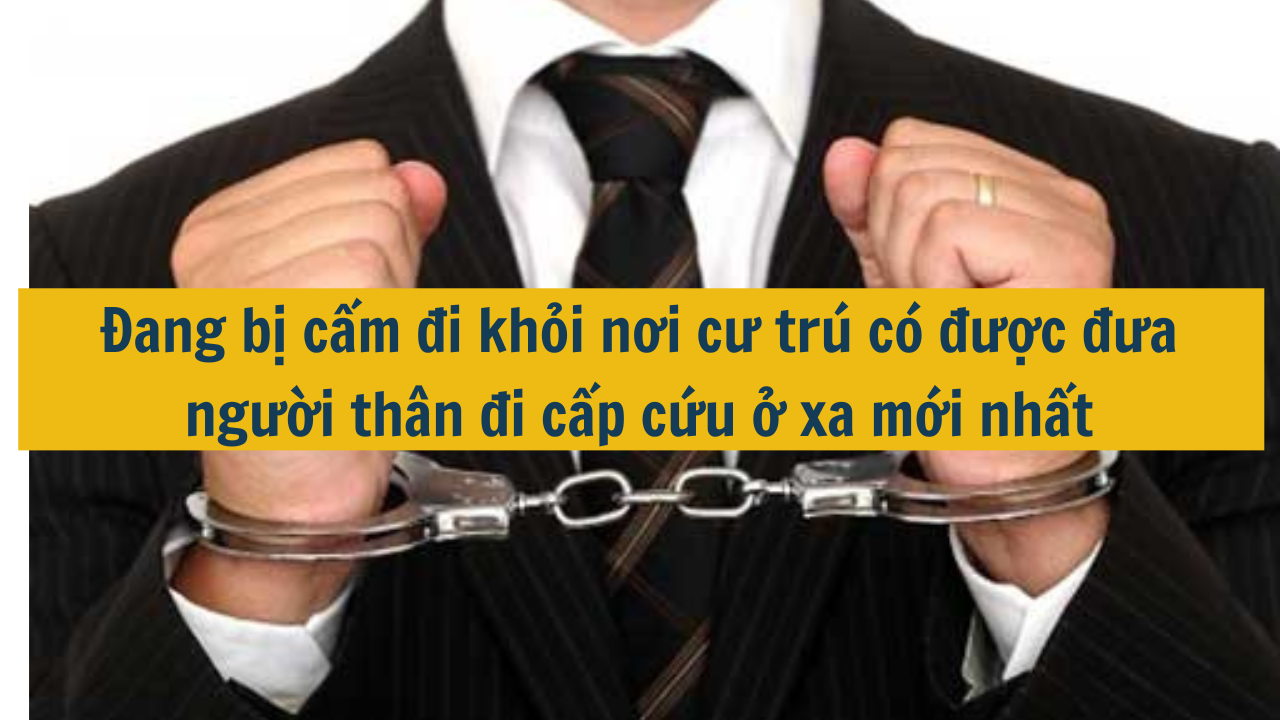
Đang bị cấm đi khỏi nơi cư trú có được đưa người thân đi cấp cứu ở xa năm 2025?
Người đang bị cấm đi khỏi nơi cư trú sẽ bị hạn chế một số quyền cơ bản của công dân. Tuy nhiên, trong những trường hợp đặc biệt, bất khả kháng người cấm đi khỏi nơi cư trú vẫn có thể thực hiện được quyền đi lại của mình. Bài viết sau đây sẽ làm rõ vấn đề đang bị cấm đi khỏi nơi cư trú có được đưa người thân đi cấp cứu ở xa năm 2025 không? 21/01/2025Cấm đi khỏi nơi cư trú có được đi làm không 2025?
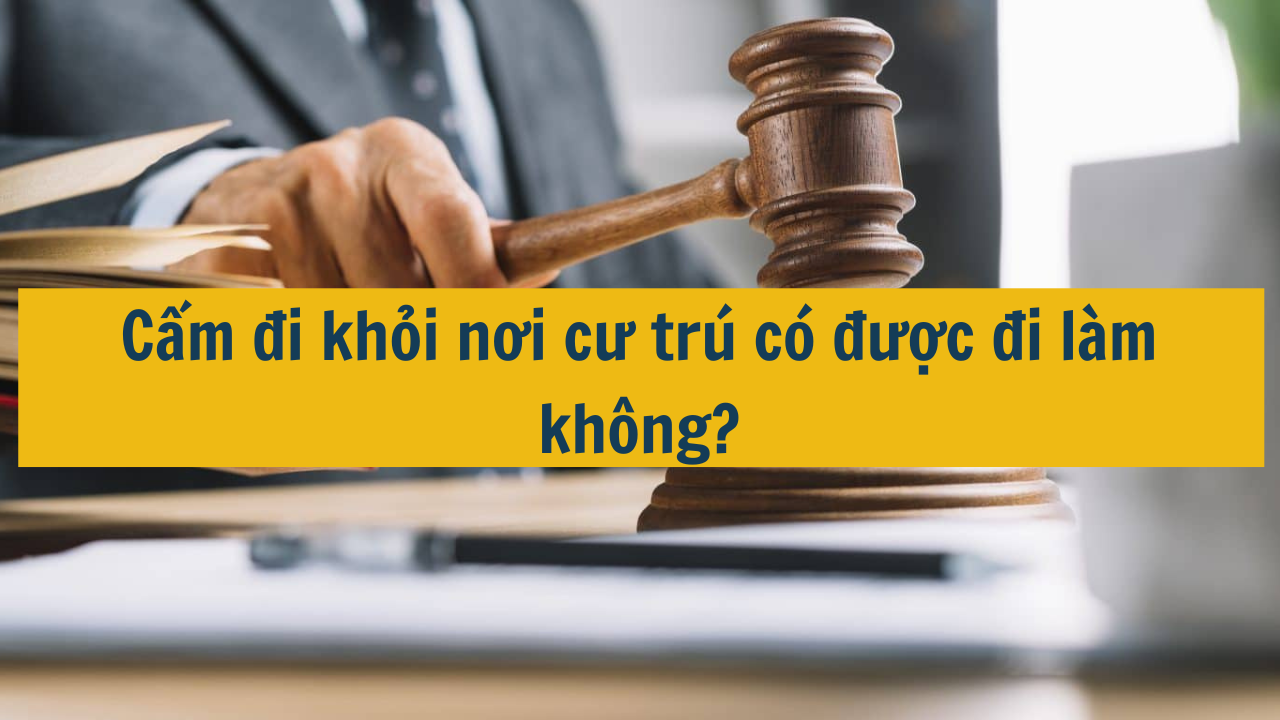
Cấm đi khỏi nơi cư trú có được đi làm không 2025?
Cấm đi khỏi nơi cứ trú là một trong những biện pháp ngăn chặn được quy định trong Bộ luật tố tụng hình sự. Vậy người bị cấm đi khỏi nơi cư trú bị hạn chế những quyền gì? Bài viết sau đây sẽ làm rõ vấn đề này. 21/01/2025Các trường hợp cấm đi khỏi nơi cư trú 2025?

Các trường hợp cấm đi khỏi nơi cư trú 2025?
Cấm đi khỏi nơi cư trú là một trong những biện pháp ngăn chặn đã được quy định trong Bộ luật Tố tụng Hình sự. Theo đó, quy định tại Điều 123 của Bộ luật Tố tụng hình sự năm 2015 đã quy định cụ thể nghĩa vụ của bị can, bị cáo được áp dụng biện pháp cấm đi khỏi nơi cư trú phải cam đoan; bổ sung thời hạn áp dụng đối với biện pháp cấm đi khỏi nơi cư trú. Bài viết sau đây sẽ làm rõ về biện pháp cấm đi khỏi nơi cư trú và các bài viết liên quan. 21/01/2025Cấm đi khỏi nơi cư trú là gì? 06 điều cần biết về cấm đi khỏi nơi cư trú mới nhất năm 2025?

Cấm đi khỏi nơi cư trú là gì? 06 điều cần biết về cấm đi khỏi nơi cư trú mới nhất năm 2025?
Luật Cư trú năm 2020 cơ bản kế thừa quy định của Luật hiện hành, đồng thời sửa đổi, bãi bỏ và làm rõ hơn các quy định trước đây nhằm bảo đảm tốt hơn nữa quyền tự do cư trú của công dân; góp phần nâng cao hơn nữa hiệu quả công tác quản lý nhà nước về an ninh, trật tự trong tình hình mới; thực hiện việc đơn giản hóa thủ tục hành chính, giấy tờ công dân liên quan đến công tác đăng ký, quản lý cư trú; đáp ứng yêu cầu ứng dụng khoa học, công nghệ tiên tiến trong công tác quản lý cư trú mà trọng tâm là xây dựng, quản lý cư trú qua Cơ sở dữ liệu quốc gia về dân cư. Bài viết sau đây sẽ làm rõ về chủ đề cấm đi khỏi nơi cư trú và các vấn đề xung quanh nó. 03/01/2025Phân biệt cách tính trợ cấp thôi việc và trợ cấp mất việc làm

Phân biệt cách tính trợ cấp thôi việc và trợ cấp mất việc làm
Trợ cấp thôi việc và trợ cấp mất việc làm là hai hình thức hỗ trợ tài chính khác nhau dành cho người lao động khi chấm dứt hợp đồng lao động. Mặc dù đều liên quan đến việc kết thúc công việc, nhưng cách tính và điều kiện hưởng của hai loại trợ cấp này có những điểm khác biệt rõ rệt. Cùng xem bài viết Phân biệt cách tính trợ cấp thôi việc và trợ cấp mất việc làm dưới đây để hiểu rõ hơn về 02 loại trợ cấp này. 18/11/2024Quy định về giữ người trong trường hợp khẩn cấp theo Bộ luật Tố tụng hình sự 2015
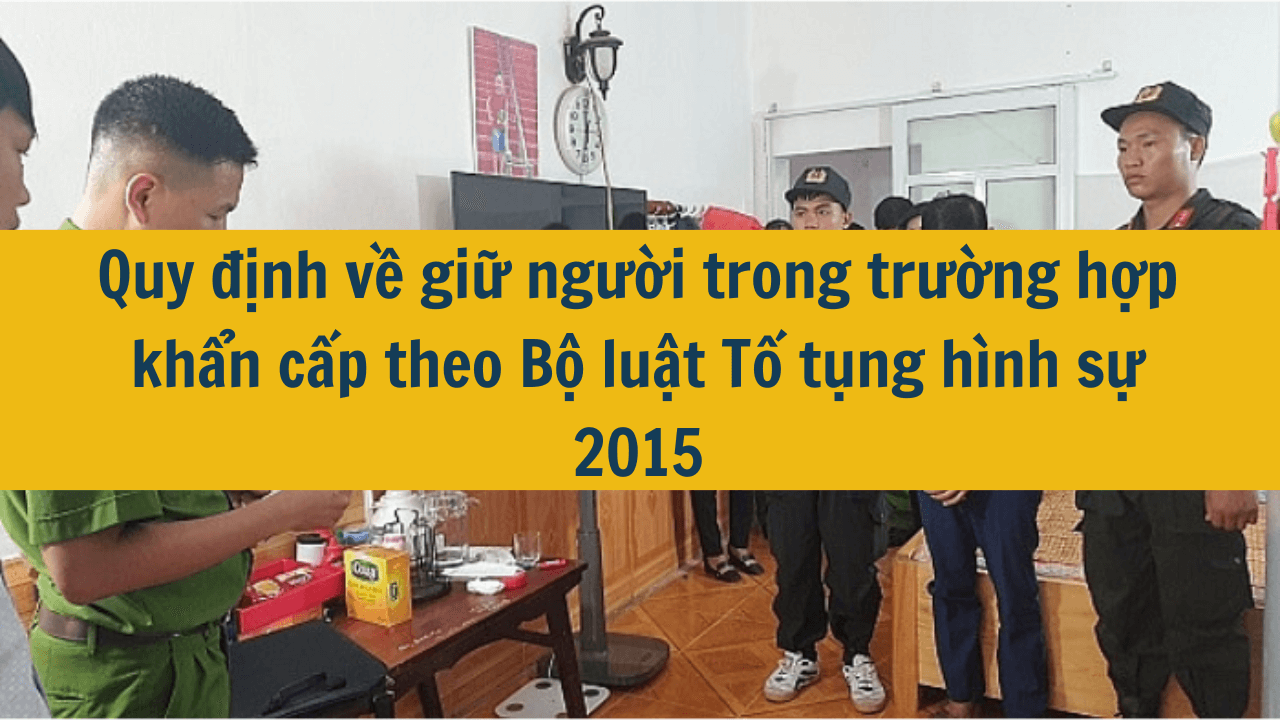

 Bộ luật Tố tụng hình sự 2015 (Bản Pdf)
Bộ luật Tố tụng hình sự 2015 (Bản Pdf)
 Bộ luật Tố tụng hình sự 2015 (Bản Word)
Bộ luật Tố tụng hình sự 2015 (Bản Word)